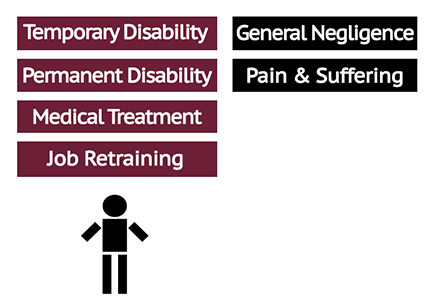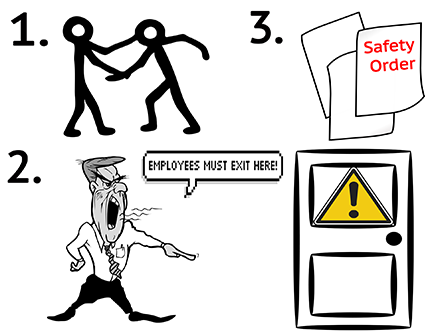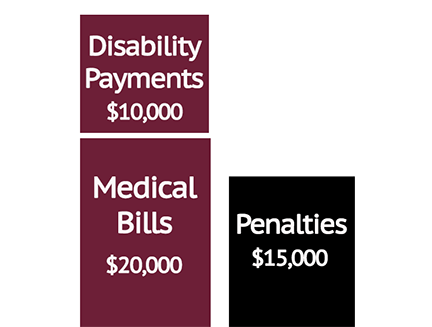Claims for Serious and Willful Misconduct of an Employer
Injured employees regularly ask our California workers’ compensation attorneys the following:
- Can I sue my employer for negligence?
- Can I get punitive damages against my employer?
Our workers’ compensation lawyers explain to injured employees that they cannot generally sue their employer for negligence. Still, they can receive significant penalties against their employer for serious and willful conduct.
California Workers’ Compensation System is a No-Fault System
 In the California workers’ compensation system, a workers’ compensation attorney does not have to prove negligence on behalf of the employer to win. If an employee suffers injuries arising out of and in the course and scope of employment, they are generally entitled to the primary benefits of the workers’ compensation system. These benefits typically include temporary disability payments, medical treatment, permanent disability, and job retraining benefits when needed.
In the California workers’ compensation system, a workers’ compensation attorney does not have to prove negligence on behalf of the employer to win. If an employee suffers injuries arising out of and in the course and scope of employment, they are generally entitled to the primary benefits of the workers’ compensation system. These benefits typically include temporary disability payments, medical treatment, permanent disability, and job retraining benefits when needed.
In exchange for not needing to prove fault against the employer, the legislature took away a workers’ compensation lawyer’s ability to sue for general negligence, pain, and suffering. For most, this trade-off makes sense. However, for those subject to significant injuries, this can be frustrating.
Serious & Willful Misconduct by Your Employer
When an injury on the job is caused by something worse than negligence, an employee may be entitled to penalties for serious and willful misconduct. Failure is when an employer fails to act like a “reasonable person would act in the same or similar circumstance.” Simplified negligence is when an employer fails to act reasonably or to exercise primary care. Unfortunately, an employer’s failure does not generally allow an employee to receive extra penalties.
But what constitutes “serious and willful misconduct”?
 This term is subject to litigation by workers’ compensation lawyers. It involves many twists based on technical nuances in the law. However, a few definitions do exist.
This term is subject to litigation by workers’ compensation lawyers. It involves many twists based on technical nuances in the law. However, a few definitions do exist.
1. Deliberate Injury to an Employee
When an employer deliberately injures an employee, this conduct is considered more than mere negligence and subject to severe and willful penalties.
2. Injury to an employee when an employer knows the probable result is a severe injury and disregards the potentially damaging consequences
This situation is more common. It occurs when an employer is fully aware their employee could be seriously injured and, despite that knowledge, requires them to proceed regardless of the known potential injury. This situation generally means the employer actually “knows” of a dangerous condition and requires the employee to proceed in the face of an adverse condition. This is much more than passive negligence. It’s making the conscious decision to subject employees to particularly dangerous risks with full knowledge that injuries could be severe.
3. Violation of a Safety Order
Generally, the easiest way for a workers’ compensation lawyer to prove a case of severe and willful injury is a violation of a safety order or similar law passed to protect the safety of individuals. In this case, an injured employee’s attorney generally shows an order was violated, which caused the injury or wrongful death. Before the injury, the employer knew the conditions that violated the safety order and failed to fix them.
How Much are Penalties for Serious & Willful Misconduct
 Penalties are generally an additional fifty percent (50%) of all benefits received, which can be significant depending on the number of injuries. If an employee had $20,000 in medical bills and $10,000 in disability payments, and the injury was severe and willful, an employee would receive an extra $15,000 in benefits.
Penalties are generally an additional fifty percent (50%) of all benefits received, which can be significant depending on the number of injuries. If an employee had $20,000 in medical bills and $10,000 in disability payments, and the injury was severe and willful, an employee would receive an extra $15,000 in benefits.
The bills could easily be hundreds or even millions when severe injuries result in intensive care unit (ICU) treatment. An increase of 50% in those bills could be a sizable exposure.
If you believe your employer acted with more than mere negligence and you suffered severe injuries, as a result, you may be entitled to significant penalties. A Sacramento workers’ compensation attorney at Eason & Tambornini will provide a free consultation under the California workers’ compensation law to determine if you have a claim for penalties.
